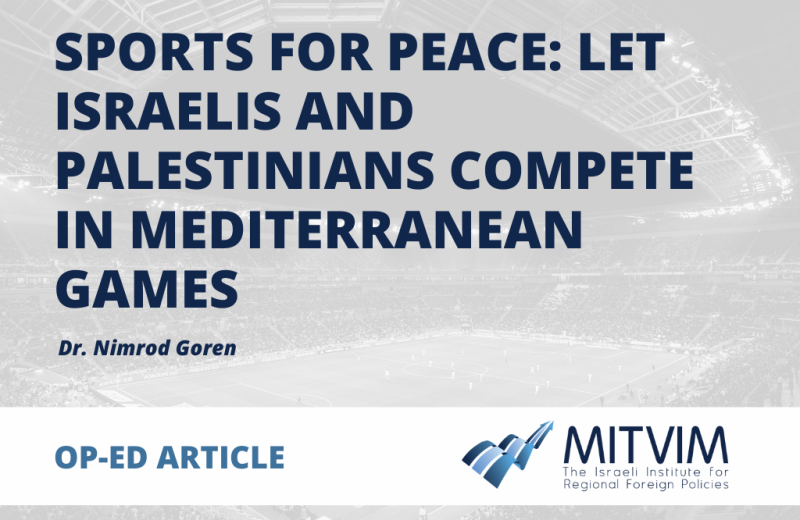A month earlier, the leaders of the Israeli and Palestinian NOCs were honored in Rome with a “Sport for Peace” concert. At the event, the Italian vice president of the International Olympic Committee Mario Pescante referred to their participation in the Games and said that “it is a battle that has been going on for nearly twenty years, it is not very optimistic. Someone will take my place and continue the pursuit, I did not succeed for the Games of Bari (1997), nor for those of Pescara (2009).”
Later in 2011, optimism did emerge. The IOC announced that it was pleased to learn that the Executive Committee of the International Committee of Mediterranean Games has unanimously called upon all its members to do their utmost to ensure Israeli and Palestinian participation in the next edition of the Games (in Turkey, 2013). Jacques Rogge, then-president of the IOC, called it “a great step forward” and emphasized that the IOC has “the moral duty to use sport as a tool for peace and development.” A decision regarding Israeli and Palestinian participation was anticipated in June 2012, but at the last minute the issue was dropped from the Executive Committee’s agenda, apparently due to unrelated internal affairs of the International Committee of Mediterranean Games.
In the decade that has passed, no progress was made and the issue was off the ICMG’s agenda. The stagnation in the Israeli-Palestinian peace process, international campaigns to recognize a Palestinian state led by the Palestinian Authority and pro-settlement policies of Benjamin Netanyahu’s governments have taken their toll on relations between the Israeli and Palestinian NOCs. Negotiations and attempts for cooperation were replaced with disconnect, quarrels and calls for boycott.
But currently there may be a window of opportunity to finally make progress. The Israeli and Palestinian interest to participate in the Games seems to still be in place; under Israel’s current government, there has been renewed engagement between top-level Israeli and Palestinian officials and government ministries; and Israel’s relations with some countries in the Mediterranean have been improved (Egypt, Jordan, Turkey) and renewed (Morocco).
While Mediterranean athletes compete in Algeria, efforts toward future Israeli and Palestinian participation should be relaunched. The goal should be full participation in the 2026 Mediterranean Games in Italy and symbolic participation already in the 2023 Mediterranean Beach Games in Greece. Italy’s long-standing support for Israeli and Palestinian participation, coupled with its being the host of the 2026 Games and with the fact that the current president of the International Committee of Mediterranean Games is Italian (Davide Tizzano) should help stir developments in the right direction, assuming Israel and the PA decide to formally apply.
Should that happen, a three-fourths majority of International Committee of Mediterranean Games countries will be required, and current regional developments make this goal more feasible than ever before.
Inclusion and integration are keys for the success of the Mediterranean as a region, and sports is a tool that can contribute to their advancement. Should the countries of the Mediterranean want to help Israelis and Palestinians advance toward peace, a symbolic step could be to invite them to compete.
Running, swimming and jumping will not bring the two-state solution on their own, but they may help in fostering a sense of shared regional identity and belonging among the conflicting parties. This is the Olympic spirit, and the Israeli-Palestinian conflict needs some more of it.
 Op-eds
/ Israel and the East Mediterranean
Op-eds
/ Israel and the East Mediterranean


